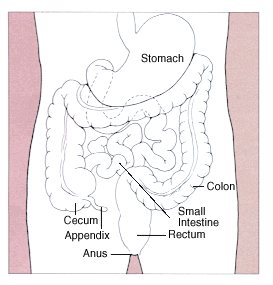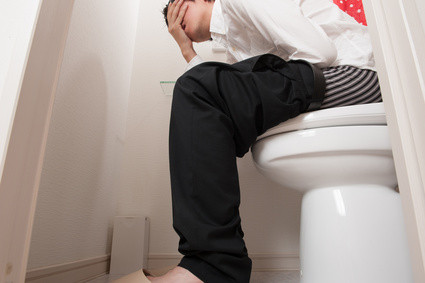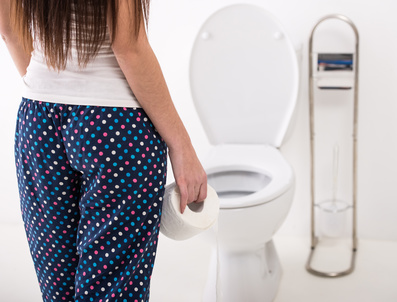Thin Stools (Pencil Thin Bowel Movement) Causes
Changes in color, consistency and frequency of bowel movements are often considered as symptoms of various diseases. For example, black bowel movement, watery stool or passing stool more then 3 times a day would be considered abnormal for most people. However, the thickness of stool is almost never considered unless the stool is very hard and large. On the other end, stool that is very thin may also be a symptom of some underlying disease.
What are thin stools?
The thickness of stool is determined by the passage it travels through as it is expelled from the body. This means that the terminal part of the colon, rectum and anal canal play a role in the thickness of the stool provided that the stool is of a soft consistency but not liquid. The odd bout of pencil thin bowel movement is not a cause for concern but it should be investigated if it persists.

Pencil thin stools can occur due to a host of causes. It is usually associated with narrowing within the lower parts of the large intestine. Sometimes it occurs with acute diarrheal illnesses that are not severe and resolve within a few days even without treatment. However, pencil thin stools can also be a sign of serious conditions such as bowel cancer which can be life-threatening.
Causes of Pencil Thin Stools
Any narrowing or obstruction of the bowel can lead to thin bowel movements. This may arise with a mass or constriction of the bowel. Even abnormal distension of the bowel or damage to the nerves that control bowel motility may contribute to obstructions within the bowel. Any cause of diarrhea may also result in pencil thin stools. The latter is usually less serious and causes short term thinning of the stools.
Diarrheal Illnesses
- Gastroenteritis and enterocolitis are common diarrheal conditions caused by infections. It usually starts suddenly and there is severe diarrhea which is at times accompanied by nausea, vomiting and abdominal cramps. In severe cases there may be bloody diarrhea.
- Inflammatory bowel disease (IBD) is an autoimmune condition where there is extensive inflammation of the bowels. Alterations of bowel habit (usually diarrhea), pain, blood and/or mucus in the stool are some of the symptoms of IBD.
- Irritable bowel syndrome (IBS) is a functional bowel disorder where there is alteration of the bowel habit (constipation or diarrhea) along with abdominal pain. The exact cause is unknown but it is not due to any disease. Mucus may be present in the stool but usually there is no blood.
Narrowing or Obstruction
- Fecal impaction arises when stool becomes a hard dry mass in the lower bowels. It causes and obstruction although liquid stool may seem around the mass. Small amounts of pencil thin stool may eventually be passed out after straining. Pain and rectal bleeding may also be present.
- Colon polyps are outgrowths from the inner wall of the colon. These masses can be benign or precancerous. At times there may be no symptoms of these polyps and it is discovered upon diagnostic investigations like a colonoscopy. Larger polyps can obstruct the colon.
- Cancer is another possible causes of pencil thin stools due to narrowing. This includes colorectal cancer and anal cancer. Changes in appetite, weight loss, anorectal bleeding and pain are some of the symptoms that may be present but often there are no symptoms in the early stages. The serious nature of this condition as well as the fact that colorectal cancer is one of the more common malignancies, it should always be a consideration when pencil thin stools occur and persist.
- Hernias are protrusions in the abdominal wall and if a portion of the colon becomes trapped within these pouches it can cause narrowing. There can be serious complications if the hernia becomes strangulated where the blood supply to the colon is cut off.
- Volvulus is a condition where the bowel becomes twisted. This is more likely to occur at the cecum of the large intestine or the sigmoid colon and the small intestine may also become trapped. These types of obstruction lead symptoms such as vomiting, constipation, abdominal pain and bloody stools.
- Intussusception is a condition where one part of the colon slips into the adjacent part. This telescoping is more likely to occur in newborns. Apart from leading to a narrowing of the colon, the intussusception can also result in reduced blood supply to the colon and even lead to tissue death of the affected portion.
- Anorectal strictures are a narrowing between the rectum and anus that may arise for a number of reasons. A mass outside the bowels that presses on it, scar tissue and other abnormalities may make this areas narrower than normal.
- Acute colonic pseudo-obstruction is where a portion of the colon stretches (distends) and the contents of the colon may not be able to move beyond this point. This is also known as Ogilvie’s syndrome. Certain drugs, injury to the bowels, recent surgery and severe dehydration are some of the possible causes.
- Foreign objects are when non-edible and usually indigestible items are consumed and subsequently cause a bowel obstruction. Sometimes a large gallstone may also cause a bowel obstruction and this is known as a gallstone ileus.

Warning Signs
The presence of bloody stools often concerns most people and while it may be serious, there are other signs and symptoms that also need to be taken seriously. This includes dizziness, confusion, persistent vomiting, unexplained weight loss and large volume diarrhea. The signs of dehydration like changes in skin turgor, dry mouth, reduced tear production and signs of shock should be closely monitored and treated immediately.
Prolonged passing of thin stools especially when it is becoming progressively worse may indicate a serious underlying cause. It should not be ignored. Medical attention is necessary and further diagnostic investigation is often warranted to find the underlying condition. Delaying the diagnosis and treatment of pencil thin stools can lead to complications which may be life-threatening.
Never use laxatives to attempt to remedy pencil thin stools. Always consult with a medical doctor.
Last updated on September 10, 2018.





